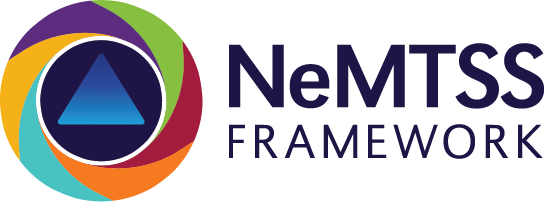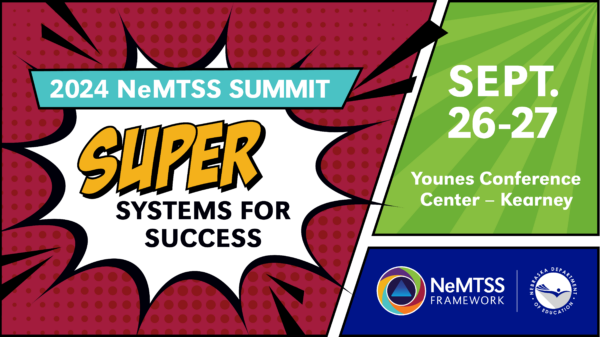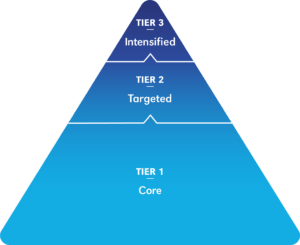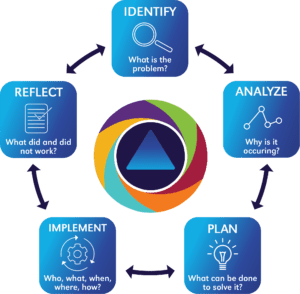

2024 Nebraska MTSS Summit – Hybrid
“Super Systems for Success”
September 26-27, 2024
Younes Conference Center North
Kearney, Nebraska
“Super Systems for Success” is the theme of this year’s hybrid event, hosted by the Nebraska Department of Education’s Office of Special Education and Office of Coordinated Student Support Services.
Registration is $125
The summit will feature keynote and breakout sessions focused on four key strands — school safety, behavior, foundational literacy, and MTSS — recognizing the synergy that arises when these individual strands form connections within a strong school system.
Sessions will provide educators with opportunities to develop their individual “superpowers” to systematically promote inclusive practices and support staff in improving outcomes for all students.
More details are available on the summit website, including registering and reserving lodging. Consider bookmarking our summit blog and following us on Twitter and Facebook to receive updates.
NeMTSS Summit Presentations
2023 Virtual NeMTSS Summit Presentations
Video recordings from the summit presentations are available for registrants to view, as well as presentation slides, handouts, and other resources.
If you have questions, please get in touch with us – HERE
*Please note; The 2023 presentations and slides are intended for registrants only. Do not copy, reproduce, or distribute any of the materials. For further questions on materials, please contact the presenter directly.*
2022 Virtual NeMTSS Summit Presentations
Video recordings from the summit presentations are available for registrants to view, as well as presentation slides, handouts, and other resources.
If you have questions, please get in touch with us – HERE
*Please note; The 2022 presentations and slides are intended for registrants only. Do not copy, reproduce or distribute any of the materials. For further questions on materials, please contact the presenter directly.*
2021 Virtual NeMTSS Summit Presentations
*Please note; The 2021 Virtual presentations are linked to the UNL MTSS website and are intended for registered attendees only*
2020 Virtual NeMTSS Summit Presentations
*Please note; The 2020 Virtual presentations are linked to the UNL MTSS website*
Below are some presenter materials from the 2019 NeMTSS Summit
*Only presentations that were made available to us by the presenters are included*
Adam Weaver
FBT-MTSS2019 worksheet
FBT-MTSS2019
Alcott Spotlight
Alcott MTSS Presentation 2019
Ali Hearn
NE MTSS Conference_Fall In Love with the TFI
Alyssa Anson, Karen Haney & Kayla Parr
MTSS Summit-GOLD Presentation
Nebraska’s-Learning-Pathways-for-GOLD 2019-2020
Results Matter TA Doc 2019
Amanda VanDerHeyden
Nebraska_pm – *Please contact Leslie at leslie.galloway@nebraska.gov for this presentation*
Amanda Witte & Kristen Derr
Partnerships for Student Success – MTSS Conference_8-23-19
Barbara Mitchell
District Action Plan Template
District Level Considerations_9.5.19
District Systems Fidelity Inventory 080519
NE MTSS Workshop
SWPBIS Tiered Fidelity Inventory (TFI) 2017
Tier 2 Behavior Supports within MTSS_9.4.19
Dr. Felicity Post
An SEL Learning Approach-What Children Deserve Presented at MTSS Summit Fall 2019
Dr. Gail Chan
NE MTSS Sept 2019_No Video
Dr. George Batsche (Keynote Speaker)
NeMTSS Summit KEYNOTE
Alignment Across Tiers and Lesson Planning
Case of Brian Instructional Plan
GB Nebraska Break Out
Lesson Design and Implementation Guide
Lesson Design and Implementation Template
Dr. George Batsche & Dr. Judy Elliott (Keynote Speakers)
NE half day session HO’s
Planning and Problem Solving Worksheet
SAM Individual Record
Dr. Judy Elliott (Keynote Speaker)
NE KEYNOTE
181018-New-MTSS-Self-Assessment
NE Break out Session HO’s
Dr. Kelly Georgius
MTSS Math Standards and Strategies
Dr. Linda Karges-Bone
A Brain Treat for the Holiday
Brain Tips Revised Summer 2018
Family Engagement Nebraska 2019
Raising Smarter children – *Please contact Leslie at leslie.galloway@nebraska.gov for this presentation*
Dr. Shirley Vargas & Lane Carr
2019-AQuESTT-Reporting-Key-Messages
AQuESTT_System of Support
AttendanceMattersEdLeaders
InternalSupportforSchools
Ethan Mitnick
Nebraska MTSS Notecatcher
Nebraska MTSS Reflection Sheet
John Parsons JD
Effects of Poverty on Children
John Schwartz
MTSS MAP Presentation 2019
Judith Carta & Robin Miller-Young
How Strong is Your Tier 1 workshop
Instructional Leadership Team Task Checklist 9-1-19 workshop
Moving an Early Education Program into an MTSS-Part 1-Introducing MTSS in Early Childhood workshop
Moving an Early Learning Program into an MTSS – Part 2 Leadership and Implementation Science workshop
Moving an Early Education Program into an MTSS – Part 3 on Tier 1 workshop
Moving an Early Learning Program into an MTSS – Part 4 Problem solving 9-3-19-workshop
MTSS Nebraska BREAKOUT Carta & Young 9-2-19 JC (1) FINAL
MTSS_RtI in EC Leadership, Consensus, PD Blog Entries 10-10-15
MTSS_RtI in EC Leadership, Consensus, PD Blog Entries 10-10-15
Kimberli Breen
NE Coaches MTSS Handouts 0919
Kristy Feden & George Toman
School Psych Q and A for Sept MTSS Conference
Lauren Evanovich
NE MTSS_ RP Part 1 Building the foundation
NE MTSS- Part 2 reactionary practices working to repair harm
Liberty High School
ESSA_LHS_6_11_19_Online Version – *Please contact Leslie at leslie.galloway@nebraska.gov for this presentation*
Loretta Tabor
MTSS Symposium Handout – *Please contact Leslie at leslie.galloway@nebraska.gov for this presentation*
Penny Brown
NeMTSS 2019 Handouts -3 per page
Peter DeWitt
Nebraska MTSS
Nebraska MTSS
Wahoo Spotlight
Wahoo MTSS_Presentation_September4_5_2019
Westside Spotlight
NeMTSS Summit Screening & Decisions
Presentations are no longer available
Presentations are no longer available.
Nebraska’s Multi-tiered System of Support (NeMTSS) is a framework designed through the lens of continuous improvement to guide school districts, schools, and all educators to ensure each and every student has access to learning experiences that enhance their educational outcomes. This is accomplished through a whole child approach to ensure each student’s social, emotional, behavioral, academic, and environmental needs are met from prekindergarten through graduation. Continuous improvement is not the job of one or two people, working in isolation, but rather unfolds progressively and implementation is driven by district, school, and student-level teams that are dependent upon a common purpose and collaboration. The NeMTSS Framework outlines specific skills and actions to organize, support, deliver, and drive continuous improvement.
Nebraska stakeholders have identified essential elements that are critical to implement and sustain a successful NeMTSS framework.
- Infrastructure and Shared Leadership:
Sound infrastructure and effective shared leadership are the foundation from which all the other essential elements are built. Without a strong infrastructure and effective shared leadership, it is not possible to design a strong, layered continuum of support, engage in sound data-based decision-making, or support collaboration and communication.
- Layered Continuum of Support:
Within a layered continuum, tiered supports are provided to meet the unique needs of each student. Supports are dependent on data, and there is flexibility among the tiers, allowing each student to receive the support they need, when they need it. Adults are responsible for monitoring student progress and matching the support to each student’s specific needs.
- Data-Based Decision-Making:
Meeting the needs of every student requires understanding their learning journey, the root causes of challenges, and how to provide appropriate support that addresses those root causes. Data-based decision-making involves collaboration and communication from community members and caregivers, as well as district, school, collaborative, and student support teams, using a variety of data points to identify student needs and support planning.
Supporting effective data-based decision-making in NeMTSS requires district and school teams to engage in the problem-solving model to drive continuous improvement of the supports for the system. Collaborative Teams and Student Support Teams engage in the problem-solving model to identify, analyze, plan, implement, and reflect on student supports.
- Communication and Collaboration:
Effective communication and collaboration hinge upon the belief that student, family, and community engagement enhance learning experiences and are culturally inclusive and relevant for each student. Student success and engagement rely on positive partnerships and relationships to fundamentally improve the outcomes for each student, school, district, and community.
There are many misconceptions of RtI and MTSS, both nationally and in Nebraska. It is essential to have a clear and concise understanding of both. To alleviate some misconceptions:
- Response to Intervention (RtI) is in the Individuals with Disabilities Education Act (IDEA), but it is NOT only the work of Special Education.
- RtI and MTSS are NOT the same thing. Within the Layered Continuum of Support of an NeMTSS Framework, we use progress monitoring to determine if a student is responding to interventions.
- RtI goes beyond academic support. Considering the needs of the whole child, educators need to provide academic, social, emotional, behavioral, physical, and environmental support.
- Special Education is NOT Tier 3 Intensified Support.





